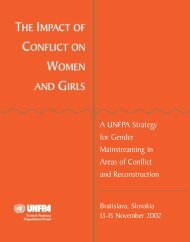Stop Sudah English-revised-March2012 - International Center for ...
Stop Sudah English-revised-March2012 - International Center for ...
Stop Sudah English-revised-March2012 - International Center for ...
Create successful ePaper yourself
Turn your PDF publications into a flip-book with our unique Google optimized e-Paper software.
While beating me on the street, he . . . pulled my hand to take me into the house and into the bedroom. He locked<br />
the door, then kicked me in the hip . . . [He] held a screwdriver . . . stabbed me, and <strong>for</strong>tunately hit my hand and<br />
broke the skin. After that, [my husband] ordered me to take off all my clothes: shirt, pants, ordered me to get<br />
naked . . . and he raped me. After I was raped, he told me to wash off the blood outside while naked without even a<br />
piece of cloth to cover [my] body. Luckily no one was at home that night . . . After I washed off the blood, he pulled<br />
me inside again and ordered me to go to sleep . . . I was still bleeding, really hurt, [so that] I could not sleep [and]<br />
at 5:00 [in the morning] I ran away to my parents’ home. Fortunately [my husband] was sound asleep so I<br />
could get away. 83<br />
2.3. Police Do Not Protect Women Victims of Domestic Violence<br />
The Documentation Team found another important thing about domestic violence that relates to reporting<br />
and handling of cases. Only some of the documented cases had been reported to the other parties, such as<br />
to the church, a husband’s supervisor or commanding officer (both in business and the military), NGOs<br />
that support victims, traditional leaders, or the government. Among reported cases, most were reported to<br />
the police, but were not handled or settled well. The Documentation Team noted at least 20 cases of<br />
domestic violence where reporting to the police did not produce anything as reflected in the following<br />
examples.<br />
One proof that the police are reluctant to handle cases of domestic violence is a written statement the<br />
perpetrator makes at the police station promising that he will no longer act violently. This statement does<br />
not have any legal value or bring meaningful change. For example, <strong>for</strong> a long time a wife (Su) was beaten by<br />
her husband, a man who also often had affairs. In November 2008, Su reported about her husband’s<br />
beatings to the police, “but it was not processed further.” The only thing done was a statement that if a<br />
problem arose again and the husband did not give the wife his salary, the wife could again take action<br />
against her husband. 84 Another woman said her husband once made a statement (which is still at the office<br />
of the Military Police) that he would not cheat again, but he continued having affairs. 85 Reluctance or delay<br />
by the police in taking action when cases of domestic violence are reported to them makes the wives feel<br />
that the police side with their husbands. In 2006, another case was reported to the Papua Police in Jayapura,<br />
but was withdrawn when the husband, a police officer, made a statement in which he promised not to<br />
commit violence again. A few months later, the perpetrator was again violent, but the victims did not report<br />
it until 2009, when she got a death threat. 86<br />
The experience of a woman victim of domestic violence in Wamena illustrates how difficult it is <strong>for</strong> a wife<br />
to settle a case of domestic violence. Her case was “settled” four times at the village level by the head of<br />
the village. He decided the husband had to pay fines to the victim and her family, but the husband stalled<br />
and just made promises. Finally, the victim reported to an NGO that accompanied her to report the case to<br />
the Wamena police. Her husband did not want the case handled by the Criminal Investigation Unit, and<br />
asked that the Vice Chief of Polic handle it. The police never settled this case. The wife’s counselor then<br />
took the case to the Wamena District Court, but until now it has not been settled and no verdict has been<br />
issued. 87<br />
83 WAM14 narrative.<br />
84 SOR21 narrative.<br />
85 Field notes on BIA30 case.<br />
86 KJP24 narrative.<br />
87 WAM16 narrative; in<strong>for</strong>mation regarding handling of the case comes from the wife’s counselor.<br />
ENOUGH IS ENOUGH! 46




![IANSA [PDF, 2MB] - PeaceWomen](https://img.yumpu.com/25206379/1/190x123/iansa-pdf-2mb-peacewomen.jpg?quality=85)
![Commitments Sample [PDF, 93KB] - PeaceWomen](https://img.yumpu.com/25206331/1/190x245/commitments-sample-pdf-93kb-peacewomen.jpg?quality=85)










![A Toolkit for Advocacy and Action [PDF, 260KB] - Peace Women](https://img.yumpu.com/25205989/1/190x245/a-toolkit-for-advocacy-and-action-pdf-260kb-peace-women.jpg?quality=85)